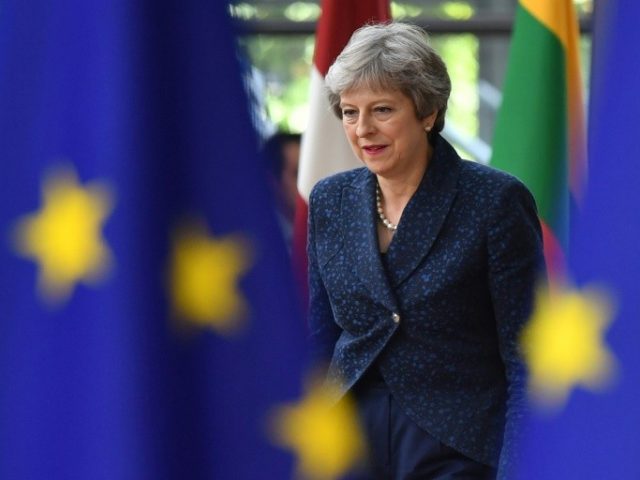This morning’s key headlines from GenerationalDynamics.com
- Report: EU and UK ready to accept ‘fudge’ to get through Brexit
- Opposition grows to the ‘fudge’ proposal
Report: EU and UK ready to accept ‘fudge’ to get through Brexit

An anti-Brexit placard at the Ireland – Northern Ireland border crossing in Killeen (AFP)
Brexit has been a pending disaster ever since the referendum passed on June 23, 2016, and many people in the UK and EU continue to look for ways to make the disaster as small as possible. So now the news is full of talk of a “fudge.”
As I explained a few weeks ago, “fudge” is being increasingly used as a stylish, fashionable word for what used to be called “kicking the can down the road.”
So in the last couple of days, there are reports that the EU negotiators are ready to agree to a “fudge” based on the so-called “Chequers plan” proposal by UK prime minister Theresa May a month ago.
May was able to twist a lot of arms to get the plan approved by her Tory cabinet at a meeting at Chequers, the prime minister’s country residence. But the euphoria did not last long, as two of her ministers resigned four days later: David Davis, the Brexit secretary, and Boris Johnson, the foreign minister.
The endless chaos in the UK government caught the attention of the EU negotiators, as officials in both governments increasingly realize the following:
- If the UK “crashes out” of the EU through a “no deal” hard Brexit, it would be severely negative for both the EU economy and the UK economy. Furthermore, it would require a hard border with full customs controls between Ireland and Northern Ireland.
- There is no credible path for Brexit to be canceled. In particular, there is no chance at all of the fantasy “second referendum” that some people want.
- Nobody has proposed a Brexit plan that would be acceptable to both the UK and the EU.
- There is a great deal of opposition from both UK and EU officials to the terms of the Chequers Plan. But it’s the only plan that even has a shot.
It has become increasingly clear among EU officials in Brussels that May will be unable to navigate an agreement between the “Remainers” and the “Brexiteers,” and there is no majority in Commons for any proposal. This would mean that the likelihood of a hard “no deal” Brexit is increasing by the day.
For that reason, EU officials are increasingly willing to “fudge” the negotiations. The plan for future EU-UK ties will not be a formal agreement but will be an aspirational statement to say as little as possible, to get past the March 29 deadline.
The main condition would be a watertight backstop arrangement to avoid a hard border between Ireland and Northern Ireland. The backstop would require setting up a customs border in the Irish Sea, which separates the Irish Isles from the British Isles. Such measures would in practice keep much of Northern Ireland’s economy under EU legal control, something that Theresa May has said is intolerable.
One senior EU official said:
The political declaration cannot violate our principles. But with the rest, whatever helps pass a withdrawal bill is fine. You can talk about many things because the backstop is the insurance if all these nice perspectives don’t work out.
Besides the backstop, the UK will have to pay the “divorce bill,” estimated to be around 39 billion pounds ($50 billion).
Other things, like the complex trading rules, the “common EU-UK rulebook,” and court jurisdiction would be left as vague as possible, to be negotiated in the transition period following formal Brexit.
And that is what we used to call “kicking the can down the road.” Evening Standard (UK) and Politics (UK) and FT and UK Government Brexit White Paper (PDF, 13-July)
Opposition grows to the ‘fudge’ proposal
Almost as soon as the report emerged that EU officials might accept a “fudge” of Theresa May’s Chequers proposal, opposition grew in both the UK and the EU.
Foreign minister Boris Johnson, a strong Brexiteer, considered the Chequers proposal to be the worst of all worlds. In his resignation letter to Theresa May last month, Johnson wrote the following:
The British government has spent decades arguing against this or that EU directive, on the grounds that it was too burdensome or ill-thought out. We are now in the ludicrous position of asserting that we must accept huge amounts of precisely such EU law, without changing an iota, because it is essential for our economic health – and when we no longer have any ability to influence these laws as they are made.
Although Johnson is a strong member of the Brexit Leave camp, people in the Remain camp, who never wanted Brexit in the first place, agree with Johnson’s opinion of the Chequers proposals.
The Remain camp is now calling it the “blind Brexit.” According to Chris Leslie, an MP in the Remain camp:
A blind Brexit would take the UK to the same place as a no-deal Brexit, but without the clarity. The idea that the fundamental contradictions of the government’s Brexit policy can be more easily resolved after the UK has left the EU is simply ludicrous.
A blind Brexit is being talked about because some see it as a short-term face-saving deal for both the British government and the European Union, both of which are now terrified that concluding with a failure to agree a deal will result in a humiliating no-deal Brexit.
With the EU27 governments and the EU commission wanting to spare Theresa May’s blushes, there is a risk we end up with a fake deal to save face.
Leslie’s statement is that it is ludicrous to think that issues that cannot be resolved before Brexit will be more easily resolved after Brexit is true, but he misses the point. The whole point of a “fudge” is to “kick the can down the road,” and if that can keep happening over and over, then the issues will never be resolved, and will never have to be resolved.
Readers may recall what happened with Greece’s financial crisis. The EU and Greece would have a major crisis meeting every few months, usually running all night, and they would announce a “fudge,” a way to postpone the crisis until the next meeting. The problems with Greece’s unsustainable debt were never resolved – it is still unsustainable. But they have found a way to kick the can down the road indefinitely.
So that is the idea behind the Brexit fudge. Leslie is right that there will be no agreement during the transition period, but if the politicians are clever enough, no agreement will ever have to be reached, and every problem will be postponed. As the Peanuts character Charlie Brown used to say, no problem is so big that it cannot be run away from.
The Remain camp is now calling itself “The People’s Vote” because it is focused on a second Brexit referendum on leaving the EU. People in the Leave camp would never agree to that, but as I understand it, even if everyone did agree, a referendum takes a long time to set up, and so it is impossible before the March 29 Brexit deadline.
For that reason, the Remain camp is seeking out its own fudge. They are trying to convince EU leaders, especially from Germany and France, to agree to a postponement of the March 29 day to give enough time for a second referendum. Guardian (London) and Daily Mail (London)
Related Articles:
- Ireland hiring 1,000 new customs and veterinary inspectors for hard Brexit (20-Jul-2018)
- Brexit negotiations in crisis as deadlines approach with no agreements (09-May-2018)
- Ireland border issue continues to confound Brexit negotiations (17-Mar-2018)
- Brexit negotiations collapse over Ireland border issue (05-Dec-2017)
- European anger and British self-delusion follow Brexit plan speech (19-Jan-2017)
- Britain’s Millennials are furious at Boomers for Brexit vote (26-Jun-2016)
KEYS: Generational Dynamics, Ireland, Northern Ireland, Brexit, EU, UK, Theresa May, Chequers, David Davis, Boris Johnson, Hard Brexit, Blind Brexit, Chris Leslie, People’s Vote, fudge
Permanent web link to this article
Receive daily World View columns by e-mail

COMMENTS
Please let us know if you're having issues with commenting.